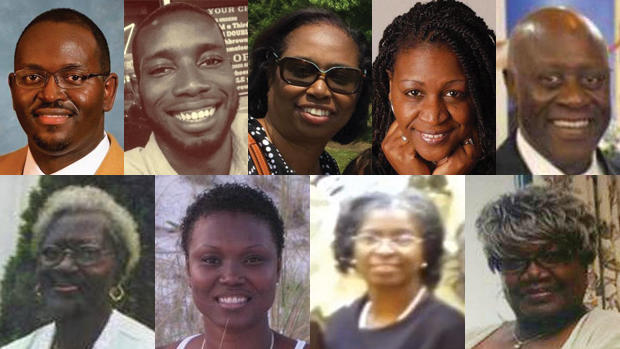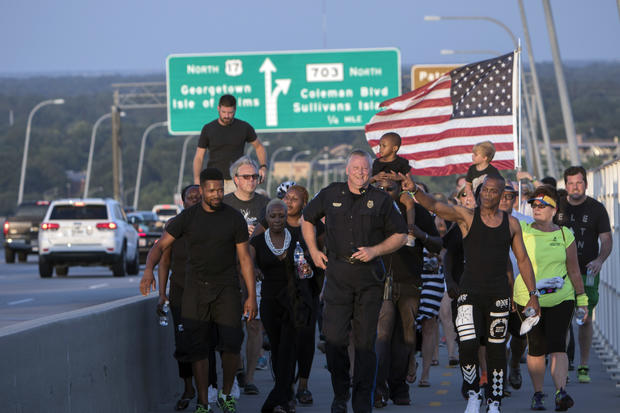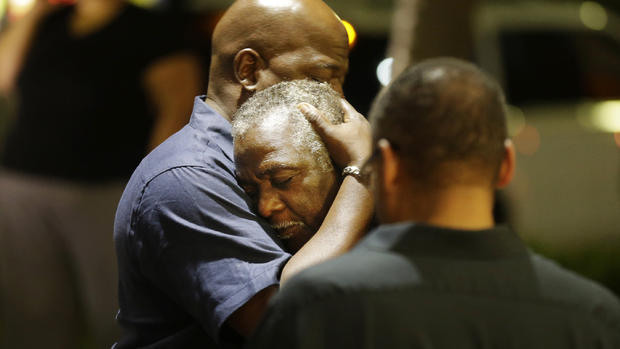After unthinkable violence, Charleston church becomes a sanctuary once again
CHARLESTON, S.C. - The congregation at Emanuel African Methodist Episcopal swayed and sang and welcomed the world into their sanctuary Sunday, holding the first worship service since a gunman opened fire during a Bible study and killed nine church members.
Messages of love, recovery and healing were interspersed throughout the service, which was marked by fervent singing and shouting, so much so that many congregants waved small fans in front of their faces. Police officers stood watch over the worshipers at the church known as "Mother Emanuel" because it is one of the oldest black congregations in the South. For added security, police officers stood watch.
"It has been tough, it's been rough, some of us have been downright angry, but through it all God has sustained us and has encouraged us. Let us not grow weary in well-doing," said the Rev. Norvel Goff, a presiding elder of the 7th District AME Church in South Carolina.
Goff was appointed to lead the historic Charleston church after Emanuel's senior pastor, the Rev. Clementa Pinckney, was shot and killed. A black sheet was draped over his usual chair, which sat empty Sunday. At least one parishioner knelt down in front of it and prayed.
Pinckney was also a state senator and married father of two children. Goff acknowledged Father's Day and reminded people that God was the ultimate father of these nine families.
"The blood of the 'Mother Emmanuel 9' requires us to work until not only justice in this case, but for those who are still living in the margin of life, those who are less fortunate than ourselves," he said.
Sunday morning marked the first service at Emanuel since Dylann Roof, 21, sat among a Bible study group for about an hour Wednesday night before opening fire after saying that he targeted them because they were black, authorities said.
As Emanuel's congregation belted out a gospel hymn, church bells rang throughout downtown in this "Holy City" - which garnered the nickname because of the numerous churches here. On Sunday evening, people gathered at the Arthur Ravenel Bridge, named for a former state lawmaker and outspoken supporter of the Confederate battle flag, in a show of solidarity.
Photographs of Roof in a purported manifesto showed him holding Confederate flags and a burning American flag.
Crowds gathered on either side of the bridge around dusk and then met toward the middle of the span. Part of the bridge was closed as people were walking, chatting and taking pictures. When the marchers from the Mount Pleasant side and the Charleston side met on the bridge, there was clapping and singing of "This Little Light of Mine."
Less than two miles from the church, someone vandalized a Confederate monument, spray-painting "Black Lives Matter" on the statue. The slogan emerged during protests over police killings of unarmed black men in several U.S. cities over the past year.
City workers used a tarp to cover up the graffiti, police said.
Photos on local news websites from before the tarp was put up showed the graffiti in bright red paint, along with the message "This is the problem. # RACIST."
On Saturday, about 100 miles away from Charleston, a large crowd rallied in Columbia against the presence of the Confederate flag on the grounds of the South Carolina Statehouse. The church massacre has renewed calls for the removal of the flag.
Police wouldn't give an estimate for attendance for the rally, but there appeared to be hundreds, if not thousands, of people there, chanting "take it down."
"We know what that flag symbolizes," Michaela Pilar Brown, a Columbia artist, said at the rally. "We know the hate. We know the danger. It says 'stop.' It says 'you are not welcome here.' It says 'fear for your life.' Take down the flag."
Roof has been charged with murder and gun possession in the commission of a crime. He was arrested Thursday in North Carolina and made his first court appearance in Charleston on Friday, via closed circuit video.
During the appearance, family members of the victims offered emotional statements, including several of forgiveness for Roof.
Felecia Sanders survived the Wednesday night attack by pretending to be dead, but lost her son Tywanza. She also spoke from the judge's courtroom, where Roof's image appeared on a television screen.
"We welcomed you Wednesday night in our Bible study with open arms. You have killed some of the most beautifulest people that I know. Every fiber in my body hurts ... and I'll never be the same," Sanders told Roof.
A law enforcement source told CBS News correspondent Pat Milton that Roof sat with the Bible study group and told investigators he thought about not shooting anyone, but then decided to go through with it after determining that no one was prepared to do it.
Meanwhile, a law enforcement source told CBS News that investigators were trying to determine the legitimacy of an online manifesto purportedly posted by the suspect which surfaced Saturday.
The document, posted by someone using Roof's name, includes a lengthy diatribe of racist ideology. The website also featured photos showing Roof posing with a gun and Confederate flags.
In the text document, Roof appears to write about his alleged plot, including why he picked Charleston as the site for the attack:
"I have no choice. I am not in the position to, alone, go into the ghetto and fight. I chose Charleston because it is most historic city in my state, and at one time had the highest ratio of blacks to Whites in the country."
The diatribe laments the lack of others willing to espouse extremist views in South Carolina: "We have no skinheads, no real KKK, no one doing anything but talking on the Internet. Well someone has to have the bravery to take it to the real world, and I guess that has to be me."
The writings were said by the author to have been inspired in part by the killing of Trayvon Martin, an unarmed black teenager who was shot by neighborhood watch volunteer George Zimmerman. Zimmerman was acquitted of murder, and the author of the manifesto said he was in the right.
Martin's family said in a statement Sunday: "It is very unfortunate that an individual with such a vile mind and clear criminal intent would dare seek to undermine our mission of peace, in an attempt to destroy the legacy of our son."
Around the country, pastors asked people to pray for Charleston and the tragedy resonated far beyond urban areas. Congregants at a small church in rural north-central Pennsylvania signed a condolence card to send to Emanuel. The Rev. Nancy Light Hardy of St. James United Church of Christ said she debated buying the card, which seemed "pitiful and lame" when set against the "inconceivable" killings.
"But at least it lets the Charleston church know that Christians across the country are thinking about them," she said.
Despite grim circumstances Emanuel faced, the welcoming spirit Roof exploited before the shooting was still alive.
Gail Lincoln said she typically attends another AME church nearby, but felt compelled to visit Emanuel this week.
"Through all of this, God is still our refuge," Lincoln said. "I'm still heartbroken but it's gonna get better. I know it's gonna take time, day by day."
Goff said reopening the doors of Emanuel so soon after the shooting "sends a message to every demon in hell and on Earth."
In a sign of resilience, the church's Wednesday night Bible study is expected to continue as normal next week, said Emanuel member Harold Washington, 75.
"We didn't change a thing," he said.


